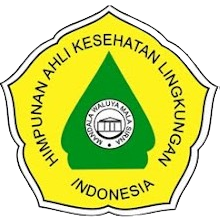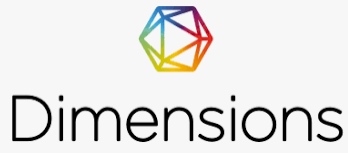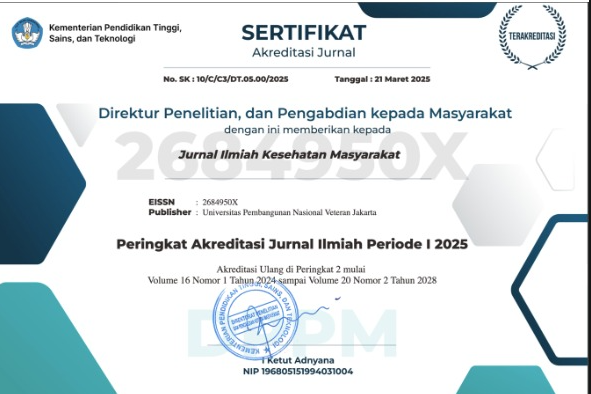Hubungan Peran Suami dan Faktor Sosial Demografi dengan Pemberian ASI Eksklusif pada Ibu Generasi Y di Puskesmas Kecamatan Kebon Jeruk Tahun 2022
Abstract
Abstrak
Latar Belakang: Saat ini cakupan ibu dalam memberikan ASI eksklusif masih sangat rendah, hal tersebut dikarenakan oleh faktor sosial demografi termasuk usia, pendidikan, penghasilan, pekerjaan serta paritas. Selain faktor sosial demografi, peran suami juga menjadi faktor penyebab rendahnya cakupan ibu dalam memberi ASI eksklusif. Berdasarkan data yang didapatkan dari Puskesmas Kecamatan Kebon Jeruk, terdapat penurunan cakupan ASI eksklusif dari tahun 2021 hingga tahun 2022, terlebih lagi pada ibu generasi Y yang berusia 25-40 tahun. Tujuan penelitian ini yaitu untuk menganalisis hubungan antara peran suami dan faktor sosial demografi dengan pemberian ASI eksklusif pada ibu generasi Y di Puskesmas Kecamatan Kebon Jeruk.
Metode: Penelitian ini menggunakan desain potong lintang dengan populasi sebanyak 316 dan total sampel sebesar 191 yang diambil menggunakan teknik purposive sampling. Pengambilan data dilakukan dengan menggunakan kuesioner serta di analisis secara univariat dan bivariat dengan uji chi square.
Hasil: Hasil penelitian menunjukkan sebesar 54,5% ibu generasi Y tidak memberikan ASI eksklusif. Ditemukan adanya hubungan antara peran suami (p=0,003), faktor sosial demografi usia ibu (p=0,002), tingkat pendidikan ibu (p=0,026), status pekerjaan ibu (p=0,002), paritas (p=0,020), dan IMD (p=0,000) dengan pemberian ASI eksklusif.
Kesimpulan: Pemberian ASI eksklusif berhubungan dengan peran suami dan sosial demografi yang diantaranya yaitu usia, status pekerjaan, tingkat pendidikan ibu, paritas, dan IMD. Diharapkan bagi para suami agar meningkatkan perannya sebagai suami serta mendukung secara penuh untuk istri memberikan ASI eksklusif sehingga ibu bisa berhasil dalam pemberian ASI eksklusif.
The Role of The Husband and Social Demographic Factors with Exclusive Breastfeeding to The Mothers of Generation Y in The Kebon Jeruk District Health Center
Abstract
Background: Currently, the coverage of mothers in exclusive breastfeeding still needs to be improved. One of the factors contributing to exclusive breastfeeding is sociodemographic factors, including age, education, income, occupation, and parity. In addition to sociodemographic factors, the husband's role is also a contributing factor to the low coverage of mothers in exclusive breastfeeding. Based on data obtained from the Kebon Jeruk District Health Center, there is a decrease in the coverage of exclusive breastfeeding from 2021 to 2022, especially for Generation Y mothers aged 25-40 years. This study analysed the relationship between the husband's role and social demographic factors with exclusive breastfeeding for Generation Y mothers at the Kebon Jeruk District Health Center.
Methods: This study used a cross-sectional design with a population of 316 and a total sample of 191 using a purposive sampling technique. Data collection was carried out using a questionnaire and analyzed in univariate and bivariate ways with the chi-square test.
Result: The research showed that 54.5% of mothers of Generation Y did not give exclusive breastfeeding. There was a relationship between the husband's role (p=0.003), social demographic factors of mother's age (p=0.002), mother's education level (p=0.026), mother's employment status (p=0.002), parity (p=0.020), and IMD (p = 0.000) with exclusive breastfeeding.
Conclusion: Exclusive breastfeeding is related to the husband's role and social demographics, which include age, employment status, mother's education level, parity, and IMD. It is hoped that husbands will increase their role as husbands and fully support their wives in exclusive breastfeeding so that mothers can be successful in exclusive breastfeeding.
References
WHO. Breastfeeding [Internet]. 2018. 2018 [dikutip 9 Maret 2022]. Tersedia pada: https://www.who.int/news-room/facts-in-pictures/detail/breastfeeding
Kementerian Kesehatan RI. Hasil Utama Riskesdas 2018. 2018.
Kementerian Kesehatan RI. Profil Kesehatan Indonesia Tahun 2020. 2021.
Kementerian Kesehatan RI. Pokok-Pokok Renstra Kemenkes 2020-2024. 2020.
Lesmana F, Rijanta, Budiani SR. Faktor Sosial Demografi yang Memengaruhi Pemberian ASI Eksklusif di Indonesia dan Pola Sebarannya Berdasarkan Provinsi. Universitas Gadjah Mada; 2019.
Lubis A, Harahap TM. Faktor-Faktor yang Berhubungan dengan Perilaku Ibu dalam Pemberian ASI Eksklusif. J Educ Dev. 2021;9(4).
Lumbantoruan M. Hubungan Karakteristik Ibu Menyusui dengan Pemberian ASI Eksklusif pada Bayi di Desa Bangun Rejo Dusun 1 Kecamatan Tanjung Morawa Tahun 2018. J Matern dan Neonatal. 2018;24(6):13–22.
Kementerian Kesehatan RI. Persentase Bayi Baru Lahir Mendapat Inisiasi Menyusu Dini (IMD) [Internet]. Kementerian Kesehatan Republik Indonesia. 2021 [dikutip 16 Juni 2022]. Tersedia pada: https://dev-satudata.kemkes.go.id/detail-data/dme/persentase-bayi-baru-lahir-mendapat-inisiasi-menyusu-dini-(imd)
Assriyah H, Indriasari R, Hidayanti H, Thaha AR, Jafar N. Hubungan Pengetahuan, Sikap, Umur, Pendidikan, Pekerjaan, Psikologis, dan Inisiasi Menyusui Dini dengan Pemberian ASI Eksklusif di Puskesmas Sudiang. JGMI J Indones Community Nutr. 2020;9(1).
Handiani D, Anggraeni D. Faktor yang Mempengaruhi Pemberian ASI Eksklusif. J Ilmu Kesehat Karya Bunda Husada. 2020;6(2).
Kusumayanti N, Nindya TS. Hubungan Dukungan Suami Dengan Pemberian Asi Eksklusif Di Daerah Perdesaan. Media Gizi Indones. 2018;12(2):98.
Rini S, Kumala F. Panduan Asuhan Nifas & Evidence Base Practice. 1 ed. Yogyakarta: Deepublish; 2017.
Badan Pusat Statistik. Berita resmi statistik. In Jakarta: Badan Pusat Statistik, Kementerian Dalam Negeri; 2020.
Mardhiyah A, Wardani DWSR, Angraini DI. Analisis Peran Keluarga terhadap Perilaku Pemberian ASI Eksklusif pada Bayi Usia 6-24 Bulan di Wilayah Kerja Puskesmas Way Halim Kota Bandar Lampung. J Major. 2018;7:106–14.
Bakri I, Sari MM, Pertiwi DF. Hubungan Dukungan Suami dengan Pemberian ASI Eksklusif di Wilayah Kerja Puskesmas Sempur Kota Bogor Tahun 2018. Promot J Mhs Kesehat Masy. 2019;2(1).
Rahmayani RO, Isgianto A, Wulandari E. Hubungan Usia Ibu dengan Pemberian ASI Eksklusif pada Bayi di Wilayah Kerja Puskesmas Bentiring Kota Bengkulu. 2016;
Suliasih RA, Puspitasari D, Afiat D. Faktor Yang Berhubungan dengan Keberhasilan ASI Eksklusif. J Kesehat Poltekkes Kemenkes Ri Pangkalpinang. 2019;20(6).
Timporok A, Wowor P, Rompas S. Hubungan Status Pekerjaan Ibu dengan Pemberian ASI Eksklusif di Wilayah Kerja Puskesmas Kawangkoan. E-Journal Keperawatan. 2018;6(1).
Mahadewi EP, Heryana A. Analisis Perilaku Pemberian ASI Eksklusif Di Puskesmas Bekasi. Gorintalo J Public Heal. 2020;3(1).
DPR RI. RUU yang Atur Cuti Melahirkan 6 Bulan Disahkan Jadi Inisiatif DPR Hari Ini [Internet]. 2022. 2022 [dikutip 5 Juli 2022]. Tersedia pada: https://www.dpr.go.id/berita/detail/id/39584/t/RUU+KIA+yang+Atur+Cuti+Melahirkan+6+Bulan+Disahkan+Jadi+Inisiatif+DPR+Hari+Ini
Hasan M, Khairani T, Harahap, Inanna, Khasanah U, Rifati B, et al. Landasan Pendidikan. Jawa Tengah: Tahta Media Group; 2021.
Novitasari Y, Mawati ED, Rachmania W. Faktor-Faktor yang Berhubungan dengan Perilaku Pemberian ASI Ekslusif di Puskesmas Tegal Gundil Kota Bogor Jawa Barat Tahun 2018. Promot J Mhs Kesehat Masy. 2019;2(4).
Sihombing S. Hubungan Pekerjaan dan Pendidikan Ibu dengan Pemberian ASI Eksklusif di Wilayah Kerja Puskesmas Hinai Kiri Tahun 2017. J Bidan “Midwife Journal.” 2018;5(1).
Fadlliyyah R. Determinan Faktor yang Berpengaruh pada Pemberian ASI Eksklusif di Indonesia. J IKESMA. 2019;15(1).
Rahma SN, Wenny DM, Agustina, Permatasari P. Hubungan Pengetahuan dan Karakteristik Ibu Baduta dengan Pemberian Asi Eksklusif di Wilayah Kelurahan Meruya Utara Tahun 2020. J Ilm Kesehat Masy. 2021;12(3).
Sutama LPSP, Arifin S, Yuliana I. Hubungan Pekerjaan, Paritas, dan Keterampilan Perawatan Payudara dengan Perilaku Pemberian ASI Eksklusif. Homeostasis. 2020;3(3):385–94.
Marwiyah N, Khaerawati T. Faktor–Faktor Yang Berhubungan Dengan Pemberian ASI Eksklusif Pada Ibu Bekerja di Kelurahan Cipare Kota Serang. Faletehan Heal J. 2020;7(1):18–29.
Deslima N, Misnaniarti, Zulkarnain. Analisis Hubungan Inisiasi Menyusu Dini terhadap Pemberian ASI Eksklusif di Wilayah Kerja Puskesmas Makrayu Kota Palembang. J JUMANTIK. 2019;4(1).









.jpg)








